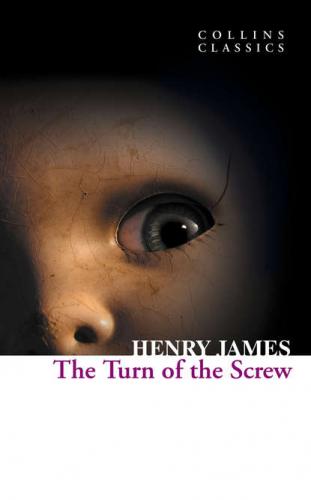THE TURN OF
THE SCREW
Henry James
CONTENTS
Classic Literature: Words and Phrases Adapted from the Collins English Dictionary
I remember the whole beginning as a succession of flights and drops, a little see-saw of the right throbs and the wrong. After rising, in town, to meet his appeal I had at all events a couple of very bad days—found all my doubts bristle again, felt indeed sure I had made a mistake. In this state of mind I spent the long hours of bumping swinging coach that carried me to the stopping-place at which I was to be met by a vehicle from the house. This convenience, I was told, had been ordered, and I found, toward the close of the June afternoon, a commodious fly in waiting for me. Driving at that hour, on a lovely day, through a country the summer sweetness of which served as a friendly welcome, my fortitude revived and, as we turned into the avenue, took a flight that was probably but a proof of the point to which it had sunk. I suppose I had expected, or had dreaded, something so dreary that what greeted me was a good surprise. I remember as a thoroughly pleasant impression the broad, clear front, its open windows and fresh curtains and the pair of maids looking out; I remember the lawn and the bright flowers and the crunch of my wheels on the gravel and the clustered tree-tops over which the rooks circled and cawed in the golden sky. The scene had a greatness that made it a different affair from my own scant home, and there immediately appeared at the door, with a little girl in her hand, a civil person who dropped me as decent a curtsy as if I had been the mistress or a distinguished visitor. I had received in Harley Street a narrower notion of the place, and that, as I recalled it, made me think the proprietor still more of a gentleman, suggested that what I was to enjoy might be a matter beyond his promise.
I had no drop again till the next day, for I was carried triumphantly through the following hours by my introduction to the younger of my pupils. The little girl who accompanied Mrs. Grose affected me on the spot as a creature too charming not to make it a great fortune to have to do with her. She was the most beautiful child I had ever seen, and I afterwards wondered why my employer hadn’t made more of a point to me of this. I slept little that night—I was too much excited; and this astonished me too, I recollect, remained with me, adding to my sense of the liberality with which I was treated. The large, impressive room, one of the best in the house, the great state bed as I almost felt it, the figured full draperies, the long glasses in which, for the first time, I could see myself from head to foot, all struck me—like the wonderful appeal of my small charge—as so many things thrown in. It was thrown in as well, from the first moment, that I should get on with Mrs. Grose in a relation over which, on my way, in the coach, I fear I had rather brooded The one appearance indeed that in this early outlook might have made me shrink again was that of her being so inordinately glad to see me. I felt within half an hour that she was so glad—stout, simple, plain, clean, wholesome woman—as to be positively on her guard against showing it too much. I wondered even then a little why she should wish not to show it, and that, with reflexion, with suspicion, might of course have made me uneasy.
But it was a comfort that there could be no uneasiness in a connection with anything so beatific as the radiant image of my little girl, the vision of whose angelic beauty had probably more than anything else to do with the restlessness that, before morning, made me several times rise and wander about my room to take in the whole picture and prospect; to watch from my open window the faint summer dawn, to look at such stretches of the rest of the house as I could catch, and to listen, while in the fading dusk the first birds began to twitter, for the possible recurrence of a sound or two, less natural and not without but within, that I had fancied I heard. There had been a moment when I believed I recognised, faint and far, the cry of a child; there had been another when I found myself just consciously starting as at the passage, before my door, of a light footstep. But these fancies were not marked enough not to be thrown off, and it is only in the light, or the gloom, I should rather say, of other and subsequent matters that they now come back to me. To watch, teach, “form” little Flora
